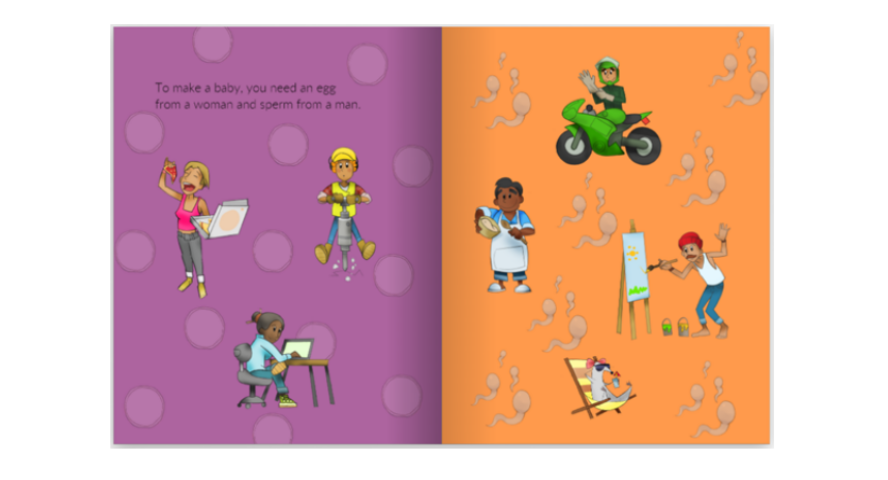The Birds and the Bees
All parents, not just those who’ve been through assisted reproduction, face the tricky (and often hilarious) dilemma when talking to their children over what to call their private parts and how to tell them about the birds and the bees.
And parents who used a donor sperm, egg or embryo are advised to tell their child when they are very young in order to avoid a big reveal moment. This entails talking about topics they wouldn’t have voluntarily strayed onto for several years.
What is recommended now is that you use the correct language with your children, even from a young age, i.e. call a vagina a vagina and a penis a penis.
Gone are the days of referring to her front bottom, va-jay-jay, foo foo or mini moo. And these ones truly make me giggle (can they have been a well-thought through solution?): her lady garden or her Aunt Mary (really???). My preferred choice of vagina though isn’t failproof – there’s a strong contingent who sit in the vulva camp. To them my use of the word vagina is incorrect as it refers to the inner part of the female genital tract – not the external part (the vulva).
And as for our boys, no more willy, little man, todger or winky. And who on God’s green earth would choose to use tiny Percy or Percy Pecker? (more leg-crossing laughter from me). Ideally refer to their penis from the outset as it’s just less complicated, and if it’s too late for that advice, introduce the term today. Kids are used to loads of things having more than one name.
But don’t just take my word for it – Today’s Parent sets out a compelling argument for accurate language. Even The Sun agrees.
The way you handle talking about sex can affect how your child feels about it for the rest of their life. Awkwardness from you is so easily picked up by them – so, try and be relaxed and open when broaching the topic.
However, as a parent it’s not always easy to know where to start. To help ease into the subject, try these top tips from theschoolrun.com. My two favourite tips are 1) don’t make it a ‘big talk’, instead casually make reference to the facts of life as opportunities present themselves and 2) don’t wait for school to cover the topic for you. You want your children to talk to you about all the stuff going on in their heads – now and as they mature – relaxed chats about topics like these pave the way for open conversations about all things later on.
Explaining your donor to your child necessitates explaining that to make a baby you need an egg and some sperm – just be matter of fact about it. The default text in our books follows the recommendations of child sex educators and psychologists. The DCN books also use standard language (they too talk about eggs and sperm). Though actually, to be quite correct we should arguably use the words ovum and uterus. At the end of the day it comes down to personal preference, for example, some of our parents prefer seed to sperm.
As every word in The Magic of You is editable, parents can change the language in their book to whatever they are comfortable with.
This articles from Today’s Parent may help you decide what to say and when. I found it reassuring to hear: “There’s more risk with not telling them enough than telling them too much”. They also recommend weaving sex into everyday discussions, layering in more information over time and introducing certain concepts at specific ages. Their article includes an age-specific guide to help you learn how to talk to kids about sex.
And this article from Australian raisingchildren.com is a must read. “It’s never too early to talk with your child about sex. Talking about sex, sexuality and bodies from when your child is young can help your child understand that sex and sexuality are healthy parts of life. Open and honest conversations when your child is young can make later conversations easier. And these early conversations also lay the groundwork for children to make healthier choices about sex when they’re older. The key early message is that your child can come to you for open, honest and reliable information, and that your child shouldn’t feel scared or embarrassed to ask you about sex and sexuality. And the good news is that talking about sex and sexuality isn’t a one-off conversation that you have to get exactly right. It’s a conversation that continues and evolves as your child grows up.”
Lots of our customers make our Magic of You book for donor conceived children as young as two – they don’t question much at that age, making the initial telling very easy.
We’ve found that donor conceived children, thanks to parents reading them books from when they were very little, know the correct terms and understand how babies are made well ahead of their peers. It’s no bad thing for them to lead on something that is often cloaked in mystery and whispered conversations in the playground. I always felt proud when my children matter-of-factly talked about their body parts.
Written by Clare McDougall, Sensitive Matters
